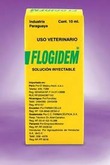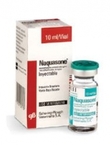Pronunciation
trye-chlor-muh-THYE-uh-zide - Pronunciation guide
Brand Names
- Naquasone/compounded
- Trichlormethiazide and Dexamethasone Bolus
Description
 Trichlormethiazide is an oral combination product marketed under the name Naquasone as a treatment for udder edema in cows. It is used to reduce mild swellings, especially in the legs of horses, by causing the body to lose water and sodium chloride by decreasing the reabsorption of these electrolytes in the kidneys.
Trichlormethiazide is an oral combination product marketed under the name Naquasone as a treatment for udder edema in cows. It is used to reduce mild swellings, especially in the legs of horses, by causing the body to lose water and sodium chloride by decreasing the reabsorption of these electrolytes in the kidneys.
An injectible form is also available in some countries.
In combination with dexamethasone, which is a potent anti-inflammatory, it should be used only under the supervision of a veterinarian who has made a proper diagnostic evaluation.
Trichlor/dexamethasone does not cure the underlying cause of the swelling.
Usage
Trichlormethiazide combined with dexamethasone is used to reduce mild swelling in the legs of horses. Because each component of the product works by a different mechanism, trichlor/dex contains a smaller dose of the individual drugs than might be used when administered separately.
Dosage and Administration
 Trichlormethiazide/Dexamethasone Trichlormethiazide/Dexamethasone |
||||
|---|---|---|---|---|
| Method | Dosage (click row for calculator) |
Concentration | Period | Duration |
| Oral (Bolus) | 0.44 mg/kg | 200 mg/bolus 1 | Daily | NA |
| Intramuscular injection | 0.5 ml/100lb | 1 ml/ml 2 | First day 2 injections, following days 1 injection | 3 days |
Notes:
|
||||
Side Effects
Trichlor/dex can mask signs of infection and should not be used when a bacterial infection is present or suspected without also treating the infection with appropriate antibiotics.
Precautions
Dexamethasone is a corticosteroid and should be used with extreme caution in any horse prone to laminitis.
Trichlormethiazide is a diuretic and prolonged use can result in electrolyte depletion and dehydration. Free access to water and salt are important.
Trichlor/dex should not be used in pregnant or lactating mares unless the benefits outweigh the risks. This combination drug is rarely used in foals, but may be used in older horses without major health problems.
Trichlor/dex is not FDA-approved for use with horses, and is a prescription drug available only by or on the lawful written or oral order of a licensed veterinarian.
Trichlor/dex is prohibited in any drug-free competition. It is important to check with the appropriate regulatory group.
Interactions
Trichlor/dex should not be used at the same time as other corticosteroids or diuretics.
Overdose
Overdose will cause electrolyte depletion and dehydration. Free access to water and salt are important at all times.
Images
 Flogidem Trichlormethiazide Injection,
Flogidem Trichlormethiazide Injection,
 Naquasone Trichlormedthiazide Injection
Naquasone Trichlormedthiazide Injection
Literature
